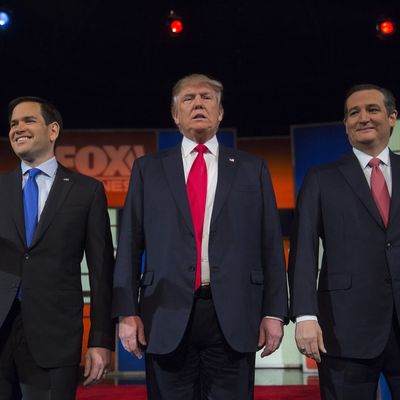
The biggest mystery of the Republican race has been the curiously persistent appeal of the obnoxious, thrice-married, former Democratic donor Donald Trump. But the second-biggest mystery has been the absence of Establishment support unifying for Marco Rubio, God’s gift to the Republican donor class. Both of those things seem just a little less mysterious now. The intense exposure of the Iowa caucus brought up Trump’s unfavorable ratings, publicizing his deviations from conservative orthodoxy. And Rubio has implanted himself as the leading, and probably sole, selection of the party regulars. As Rubio’s spokesman, Alex Conant, said Monday night on MSNBC, “If you don’t want Ted Cruz or Donald Trump as the nominee, you better get onboard with Marco Rubio.”
The Republican field looks at the moment like a three-candidate race. The ideological contours are not exactly clear. Rubio is the candidate acceptable to the party elite — the candidate who is providing a more attractive delivery mechanism for George W. Bush’s policies, which is what Republicans have craved since the Bush administration. Cruz and Trump are unacceptable to the Establishment, for roughly opposite reasons. Trump has no record of sincere commitment to conservative policy doctrine. Cruz has positioned himself as the high priest of conservative orthodoxy, flaying his fellow Republicans for their inability to impose their policies over President Obama’s veto. On foreign policy, Rubio is the most orthodox neoconservative hawk, and Trump and Cruz are more neo-isolationist. All three would repeal Obamacare and replace it with something undefined but wonderful, and pass gargantuan, regressive tax cuts. (Cruz’s plan is the least fiscally irresponsible of the three, recompensing some of the tax cut for the rich with a tax hike on the middle class and poor.)
Rubio delivered the most partisan speech of the three candidates, assailing President Obama for his alleged violations of the Constitution and other sins, and promising to unite his party. Cruz ignored the Democrats. His enemy was “deal-making,” and his ally was “the people.” Trump vaguely and listlessly thanked Iowans and tried to look like he had not suffered a surprising defeat.
It is hard to say which candidate of the three is the favorite. The morning of the primary, I hesitantly assigned the following odds of winning the nomination: Rubio 40 percent, Trump 30 percent, Cruz 20 percent, and the field 10 percent. Rubio will soon enjoy unified Establishment Republican support, but suffer with border hawks for his since-repudiated attempt to pass comprehensive immigration reform. Trump faces the wrath of the conservative movement. Cruz has the support of Evangelicals but may not have the ability to expand his coalition to a majority (unlike Trump, whose support spans the ideological gamut of the party).
One can see contours of a party edifice consolidating behind Rubio already. Paul Ryan — the pope of the GOP — held a presentation at which political analyst Dave Wasserman briefed party donors on “Trump’s potentially damaging impact on the party in down-ballot congressional contests.” Wasserman has written bluntly for FiveThirtyEight that “It’s Rubio or bust for Republicans who want to win.” Bringing in Wasserman to make his case against Trump (and, presumably, for Rubio) is surely a sign of Ryan’s loyalties.
Iowa is a highly unusual state with an outcome that may not apply from here on out. It is dominated by religious conservatives to a degree rare outside the South; its caucus format holds turnout down to the very committed; and its voters are subjected to a barrage of campaigning and advertising unlikely to be replicated elsewhere. It’s a bad state for Trump and a good state for Cruz.
Going forward, Trump may further benefit from Cruz’s survival — the fear that Cruz might win that took hold in December gave Trump his best moment of the campaign, driving some Republican regulars to his side. The longer Cruz stays alive, the longer Republican elites may need to keep Trump alive as a viable option against him. But it is also possible that Republican insiders will have finally seen the signs of life in Rubio they needed to bestow upon him his long-awaited crown.






























